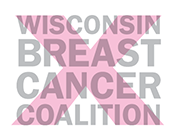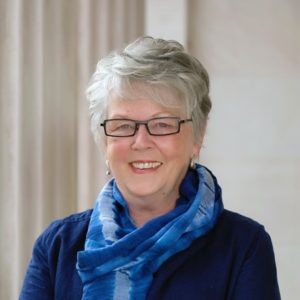 WBCC Involvement
WBCC Involvement
Founding Member and President, 1994
Served on Board of Directors
Chair of the Legislative/Policy Committee
Represented WBCC on the National Breast Cancer Coalition (NBCC) Board of Directors
Represented WBCC as NBCC’s Team Leader and Wisconsin Field Coordinator (1995–2024)
Program Chair, “Breast Cancer and Wisconsin’s Environment,” cosponsored by WBCC (1995)
Co-Chair, WBCC’s Tribute to Sara Hildebrand (1996)
Co-Chair, “You Have A Story and We want To Hear It” (2006)
Co-Chair, “Stand Up and Speak Out: Where we are today on breast cancer issues” (2007)
Chair, “A Conversation To End Breast Cancer and What It Will Take” (2012)
Longstanding member of the Wisconsin Cancer Council (WCC), serving on the Executive Committee and several working groups
Graduate of NBCC’s Project LEAD, a four-day intensive course on the science of breast cancer (1995)
Led a team of WBCC advocates and others on Capitol Hill since 1996 in support of federal funding for the Department of Defense Breast Cancer Research Program. Through grassroots efforts, funding for breast cancer research increased from 91 million in 1991 to over 4 billion dollars today.
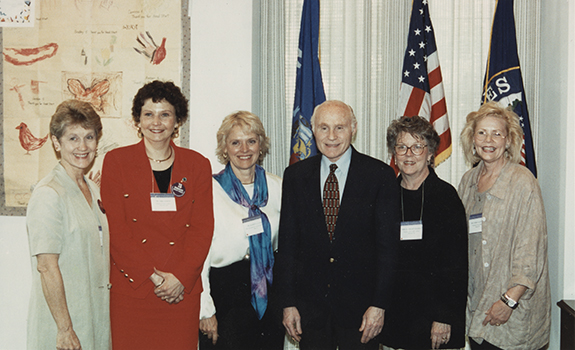
Awards

National Breast Cancer Coalition’s Advocate Leadership Award (2015)
After Breast Cancer Diagnosis (ABCD) Melodie Wilson Oldenburg Visionary Award (2019)
Breast Cancer Recovery Ann Haney Award (2018)
For her efforts in coalition building and work related to the passage of the Breast and Cervical Cancer Treatment Act, Kathleen was invited to the East Room of the White House as a guest of President Clinton to celebrate its passage into law in 2000.
When did you first become a part of the WBCC? What were your reasons for joining the organization?
When I was diagnosed with breast cancer in 1993, my doctor told me breast cancer was a common disease but not much was known about it. I was told, at the time, that breast cancer research was chronically underfunded, especially for a disease of epidemic proportion. I found this unacceptable. When I learned about the National Breast Cancer Coalition and its commitment to research and advocacy, I knew that this is where I needed to be. Soon after, a small group of women in Milwaukee and surrounding areas came together to form the Wisconsin Breast Cancer Coalition in 1994, and I became a founding member and president of WBCC.
What do you consider the most significant achievements of the WBCC?
WBCC is a small grassroots organization and yet it continues to stay the course year after year, focusing on issues and legislation that would make a significant impact on the lives of women and men living with breast cancer and those at risk. WBCC advocates stand bold and ready to tackle difficult issues. I think that’s a significant achievement.
What are the two or three most important contributions you have made to the WBCC?
I’m reluctant to call attention to my contributions when so many others have contributed to the success of the organization.
Editor’s Note: We asked Kathleen’s Policy Committee colleague and longtime WBCC advocate Dawn Anderson to respond to this question. Here’s what she had to say:
She has done so much, it’s impossible to pick just a few contributions, because they are all interrelated. In short, without Kathleen’s contributions, organized, effective breast cancer policy advocacy would likely not exist in Wisconsin. She helped establish and grow our hallmark legislative alert network. From the beginning, as our representative to the National Breast Cancer Coalition, she established and has maintained, for decades, positive working relationships with our congressional delegation and their staff in Washington DC. She has mentored and trained scores of breast cancer advocates, myself included. She encouraged all of us to attend Project LEAD so we could be well informed in the science of breast cancer and not be intimidated by taking a seat at tables where decisions are made.
When times get rough, Kathleen’s emails will often end with “Onward!” Her persistence, professionalism and positivity have carried us forward when we felt like we were swimming upstream. I would say her leadership is her enduring contribution to WBCC.
What challenges has the WBCC faced in its history? What challenges do you see the organization facing in the future?
Due to the nature of WBCC’s work, it is critically important to have representation throughout the state. It has always been difficult to reach the rural areas in Wisconsin. It was difficult from the start and it remains so today, but WBCC continues to develop strategies that will help it meet the goal of expanding a network statewide.
Despite WBCC’s many accomplishments, creating public awareness of WBCC and the work the Coalition does has always been a challenge.
Who are two or three members of the WBCC who should be recognized as part of the organization’s history? Why are they important?
I would recommend Clarice Zucker, another founding member of WBCC. Clarice is smart, witty and a joy to work with. Always focused, she dug right in to any project she was involved in. We shared the same passion and I have fond memories of working with her.
Julie Thauer of Thauer Art Direction has been a longtime volunteer for WBCC, working behind the scenes, developing and designing campaign and marketing materials, both printed and social media, from concept to finished product. She is committed to WBCC and its goals.
What has your involvement with the WBCC meant to you?
I met and worked with so many talented, passionate and committed advocates over the past 30 years. I am grateful and honored to have had the opportunity to work side by side with so many of them, especially the courageous women and men living with metastatic breast cancer who traveled to Madison and Washington DC to meet with their legislators and members of Congress, to tell their stories of the challenges they encounter every day.
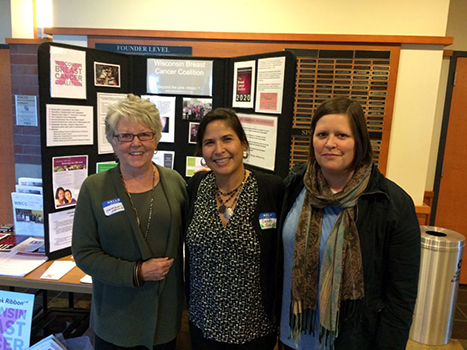
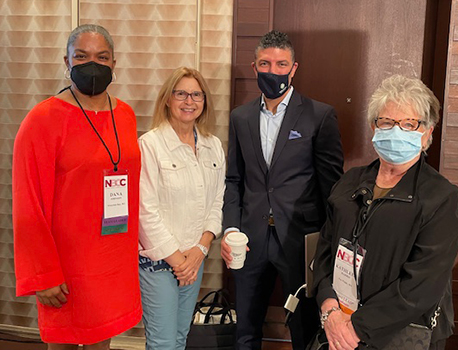
Kathleen with Sandra Gines and Lindsey Nathan O’Connor at the Breast Cancer Advocacy Boot Camp, Milwaukee, 2016
Kathleen with advocates Dana Johnson and Linda Hansen and speaker Cyrus Ghajar, NBCC Summit, Washington DC, 2022
Are there any stories you would like to share about the organization and your participation in it?
A TRIBUTE TO SARA HILDEBRAND
I read an article in the Chicago Tribune that caught my attention: EXPEDITION INSPIRATION. Sara Hildebrand of Neenah, Wisconsin, was one of 17 breast cancer survivors in the US who climbed Mount Aconcagua in the Argentine Andes on February 4, 1995, to raise awareness and funds for breast cancer research. Aconcagua is the highest peak in the Western Hemisphere.
I watched the documentary “Expedition Inspiration” with astonishment and awe, for what these breast cancer survivors endured in an effort to reach the summit. Of the 17 women who attempted the summit, three succeeded. It was a call to action for me. I couldn’t climb a mountain, but I wanted to do my part, whatever that might be. I chose advocacy. Thus began my thirty years as a breast cancer advocate, focusing on raising funds for breast cancer research and finding a cure for this insidious disease.
“Every day women battling breast cancer climb a mountain,
while all women stand in the mountain’s shadow.
Every three minutes a woman is diagnosed with breast cancer,
Every eleven minutes a woman dies from this disease.
There is no known cause, prevention or cure for breast cancer.”
“Expedition Inspiration” first aired on the PBS program New Explorers on July 12, 1995.
WBCC’s Tribute to Sara Hildebrand was held in Milwaukee in 1996.
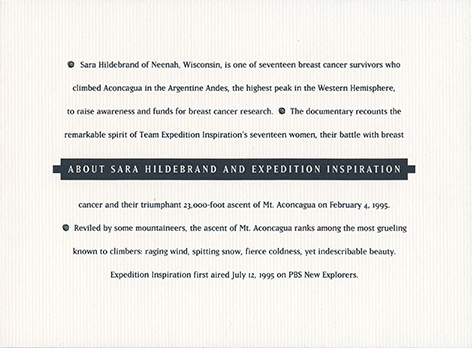
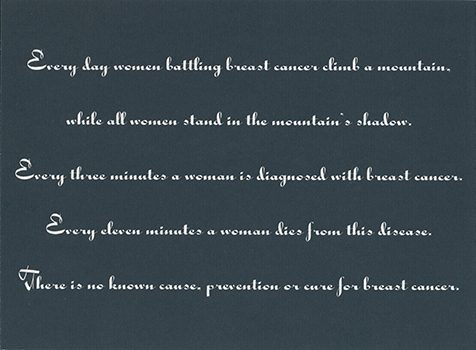
Images from the invitation to the WBCC tribute to Sara Hildebrand, 1996
(August 2024)
